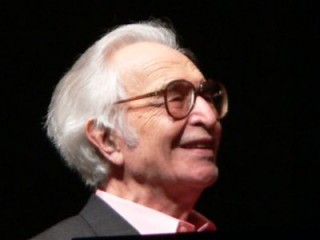
Dave Brubeck biography
Date of birth : 1920-12-06
Date of death : -
Birthplace : Concord, California
Nationality : American
Category : Arts and Entertainment
Last modified : 2010-12-10
Credited as : Jazz and West Coast Jazz singer, pianist,
0 votes so far
From nearly the start, Brubeck enjoyed utilizing poly-rhythms and poly-tonality (playing in two keys at once). He had classical training from his mother, but fooled her for a long period by memorizing his lessons and not learning to read music. He studied music at the College of the Pacific during 1938-1942. Brubeck led a service band in General Patton's Army during World War II and then, in 1946, he started studying at Mills College with the classical composer Darius Milhaud, who encouraged his students to play jazz. During 1946-1949, Brubeck led a group mostly consisting of fellow classmates, and they recorded as the Dave Brubeck Octet; their music (released on Fantasy in 1951) still sounds advanced today, with complex time signatures and some poly-tonality. The octet was too radical to get much work, so Brubeck formed a trio with drummer Cal Tjader (who doubled on vibes) and bassist Ron Crotty. The trio's Fantasy recordings of 1949-1951 were quite popular in the Bay Area, but the group came to an end when Brubeck hurt his back during a serious swimming accident and was put out of action for months.
Upon his return in 1951, Brubeck was persuaded by altoist Paul Desmond to make the group a quartet. Within two years, the band had become surprisingly popular. Desmond's cool-toned alto and quick wit fit in well with Brubeck's often heavy chording and experimental playing; both Brubeck and Desmond had original sounds and styles that owed little to their predecessors. Joe Dodge was the band's early drummer but, after he tired of the road, the virtuosic Joe Morello took his place in 1956; while the revolving bass chair finally settled on Eugene Wright in 1958. By then, Brubeck had followed his popular series of Fantasy recordings with some big sellers on Columbia, and had appeared on the cover of Time (1954). The huge success of Paul Desmond's "Take Five" (1960) was followed by many songs played in "odd" time signatures such as 7/4 and 9/8; the high-quality soloing of the musicians kept these experiments from sounding like gimmicks. Dave and Iola Brubeck (his wife and lyricist) put together an anti-racism show featuring Louis Armstrong (The Real Ambassadors) which was recorded, but its only public appearance was at the Monterey Jazz Festival in the early '60s.
The Dave Brubeck Quartet constantly traveled around the world until its breakup in 1967. After some time off, during which he wrote religious works, Brubeck came back the following year with a new quartet featuring Gerry Mulligan, although he would have several reunions with Desmond before the altoist's death in 1977. Brubeck joined with his sons Darius (keyboards), Chris (electric bass and bass trombone), and Danny (drums) in Two Generations of Brubeck in the 1970s. In the early '80s, tenor saxophonist Jerry Bergonzi was in the Brubeck Quartet, and beginning in the mid-'80s, clarinetist Bill Smith (who was in the original octet) alternated with altoist Bobby Militello.
There is no shortage of Dave Brubeck records currently available, practically everything he cut for Fantasy, Columbia, Concord, and Telarc are easy to locate. Brubeck, whose compositions "In Your Own Sweet Way," "The Duke," and "Blue Rondo a la Turk" have become standards, remained very busy (despite some bouts of bad health) into the 2000s.
















